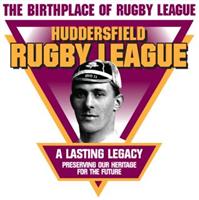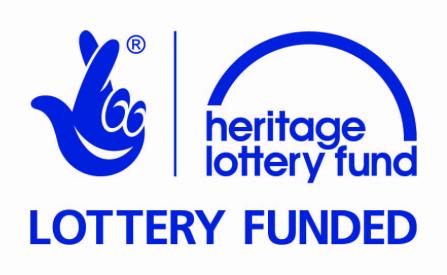Huddersfield Rugby League:
A Lasting Legacy
1864 -1914 - 2014
The ‘Huddersfield Rugby League: A Lasting Legacy’ heritage project has recently launched its website - www.huddersfieldrlheritage.co.uk. Project manager, Brian Heywood, said ‘The website is just one of many strands an extremely comprehensive and diverse project, but is important in taking our research to a wider audience’.
‘For many people sport begins and ends on the pitch, so our promotion of the Giants as the best example of living history in the town always raises an eyebrow, particularly amongst academics. But no other local organisation can trace its origins to 1864 and regularly attract almost 10,000 people onto its premises.
The project, which runs until November 2014, was launched before 140 guests at the (then) Galpharm Stadium in May. Funded to the tune of £100,000 by the Heritage Lottery Fund, it is the brainchild of Laura Hanson, manager of the Huddersfield Giants Community Scheme.
‘The timing of the project was persuasive in our application to the HLF,’ said Heywood. ‘2014 is the 150th anniversary of Huddersfield Giants, the centenary of the club’s ‘Team of all Talents’ which won all four trophies in 1914-15, and of Albert Rosenfeld’s all-time record of 80 tries in a season, set in 1913-14. The club’s captain during this glorious period was Harold Wagstaff, and the project will celebrate his career and the centenary of his greatest triumph, leading the Lions to victory in the 1914 Rorke’s Drift Test Match. In addition, the project will commemorate the centenary of the start of the Great War in Huddersfield.’
‘Perhaps our most exciting find so far has been the diary of the great Huddersfield forward, Douglas Clark, discovered in the archive at the Imperial War Museum in London. Club historian David Gronow has been the first to transcribe it. You could not read a more evocative account of life on the western front. It ends when Clark is invalided out of the war with 95% injuries.
Hearing about the project’s lengthy list of initiatives, it soon becomes clear that partnerships with other organisations are a key to its success. These include local amateur clubs, whose memorabilia has begun to appear on the website.
Heywood continued, ‘We are providing work experience for Huddersfield University students in research, archiving memorabilia and interviewing people about their memories.’
‘’Discover Huddersfield’ is another valued partner. We are working with them to produce three trails – one of Holmfirth, covering locations significant to the life of Harold Wagstaff, a World War I trail of Huddersfield, and a trail of the Rugby League Heritage Centre.’
‘Our project coincides with next year’s world cup. In October we worked with the World Cup Projects committee, Kirklees MBC, the George Hotel and Scholes J and I School in organising the launch of the World Cup Trophy Tour. The Scholes children performed a play, ‘The Birth of Rugby League’ which we co-wrote with RFL historian, Tony Collins. The play represented the past, present and future of the game, symbolising what our project is all about - and the kids had a day they will never forget, especially as they were on TV.
‘We are also working with several organisations to organise an International Rugby League Conference at the John Smith’s Stadium on 1st November 2013, the day before the World Cup match there between England and Ireland. This coincides with the 135th anniversary of the first match at Fartown, so there will be lots to celebrate. Kirklees MBC has requested that our main exhibition at Huddersfield’s Tolson Museum is launched that week, as they intend to promote it as Huddersfield’s World Cup weekend.
‘By 2014 we aim to have involved local people from 7 to 97! We are organising children’s rugby league art and writing competitions, and training children in the technologies and techniques of oral history, preparing them to interview past and present players. We also have a schools’ scheme of work, promoting learning about local history through the history of rugby league. What better way to study Victorian history than to learn about how sports clubs grew from the industrial, social and scientific developments of the time?
‘At the other end of the age range, we are producing Reminiscence Boxes to help to stimulate memories and conversation in care homes. We have liaised with the Sporting Memories Network which recently partnered Huddersfield Town in a ‘memories match’, promoting awareness of Alzheimer’s disease. We hope to promote a similar rugby league match in the 2013 season.
‘Our other publications include two books, one about rugby league stories and memorabilia that we unearth, and the other about Huddersfield in World War I. We are currently working on two sets of 50 collectors cards, which we believe are unique in concept, covering the best players to represent Huddersfield, from Harry Lodge in the 1880s to Eorl Crabtree and Danny Brough.
‘It is a real pleasure and privilege to manage this project. After all, Huddersfield is the birthplace of rugby league. The Rugby League Heritage Centre, housed at the George Hotel, is one of the country’s great sporting museums.
‘It is exhausting just to think about everything we have to do, but we are blessed with a dedicated and talented band of volunteers. They epitomise the passion, pride and enthusiasm for rugby league that has passed from generation to generation in Huddersfield.’




